Chinese money matters can be confusing when you are on China tours. The following information may help answer some of your questions and alleviate problems.
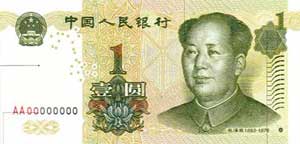 |
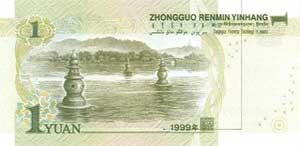 |
| The obverse of 1 Yuan | The inverse of 1 Yuan |
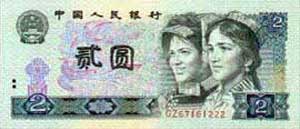 |
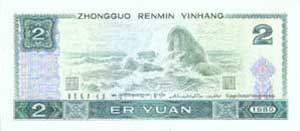 |
| The obverse of 2 Yuan | The inverse of 2 Yuan |
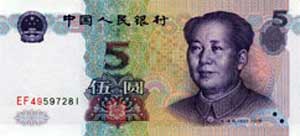 |
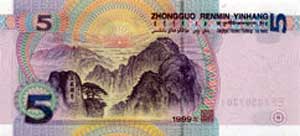 |
| The obverse of 5 Yuan | The inverse of 5 Yuan |
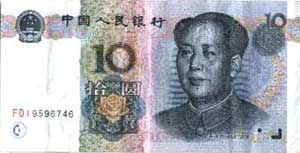 |
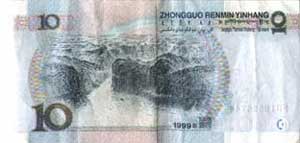 |
| The obverse of 10 Yuan | The inverse of 10 Yuan |
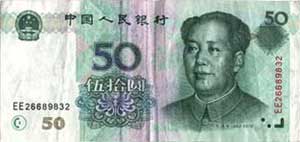 |
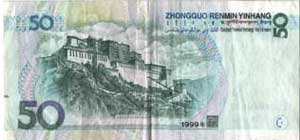 |
| The obverse of 50 Yuan | The inverse of 50 Yuan |
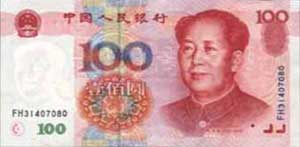 |
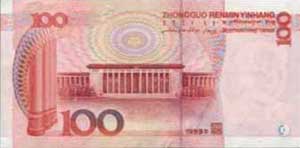 |
| The obverse of 100 Yuan | The inverse of 100 Yuan |
Chinese currency (Renminbi)
The Chinese currency is called Renminbi (people's currency) and is abbreviated as RMB. The basic unit is the Yuan. Ten Jiao make one Yuan; ten Fen equal one Jiao. Chinese currency consists of paper notes and hard coins.
Counterfeit bills are a problem in China. Very few Chinese ever accept a RMB50 or RMB100 bill without first checking to see whether or not it is fake. Notes that are old and tattered are also sometimes hard to spend. If you are having problems spending a tattered note, you can exchange it for a new one at the Bank of China. Counterfeit bills, however, will be confiscated.
Hong Kong's currency is the Hong Kong dollar and Macao's is the Macao dollar. Both currencies are worth 7% more than Renminbi.
Exchanging rates
US $1.00 = RMB 7.20 (approximately)
Carrying Money
For a trip to China and the Far East, It is better to carry money in combinations of US cash (in various denominations), traveler checks and credit cards. A money belt or pocket sewn inside your clothes is the safest way to carry money. Velcro tabs sewn to seal your pockets shut will also help thwart roving hands.
Cash
US dollars are good for the purpose of tips and small purchases. Many businesses in the urban areas will take dollars, but in more remote areas you will need to have RMB.
Credit Cards
All major cards such as Visa, Master Card, American Express, JCB and Diners Club are readily accepted in major tourist cities. They can be used in most mid-range to top-end hotels (three-star and up), Friendship Stores and some department stores. Unfortunately, it is still impossible to use credit cards to finance transportation costs; even flights have to be paid for in cash. Credit card cash advances are readily available at banks and ATM machines, even in places as remote as Lhasa. A 4% commission is generally deducted.
Remember to bring phone numbers to report lost or stolen credit cards should the need arise.
Traveler's Checks
Besides the advantage of safety, traveler checks are useful to carry in China because the exchange rate is more favorable than what you get for exchanging cash. Checks from most of the world's leading banks and issuing agencies, such as Thomas Cook, American Express and Citibank, are accepted in China. You can also purchase traveler’s checks from the Bank of China. Traveler’s checks can be cashed at banks, major hotels and department stores. Traveler’s checks in denominations of $100 or less are suggested. Your passport is always required when you are cashing traveler’s checks. Be sure to keep a copy of the serial numbers of the traveler checks, and the issuing agent’s phone number in case you need to report a loss.
ATMs
Using your ATM card is an excellent way to get cash in China. Drawing out small amounts of cash as needed from ATMs helps you avoid the risk of traveling with large amounts of cash. ATMs are available in most cities and airports in China. Money is issued in the local currency.
Except in Hong Kong and Macao, having money sent to you, via an international money transfer, in China is a time-consuming and frustrating task that is best avoided.
China Courier Service Corporation (a joint-venture with Western Union Financial Services in the USA) is very fast and efficient. In Beijing there is a branch at 173, Yong'an St. Tel: 86-10-63184285.
For foreign currency exchange rate please check http://www.exchangerate.com

